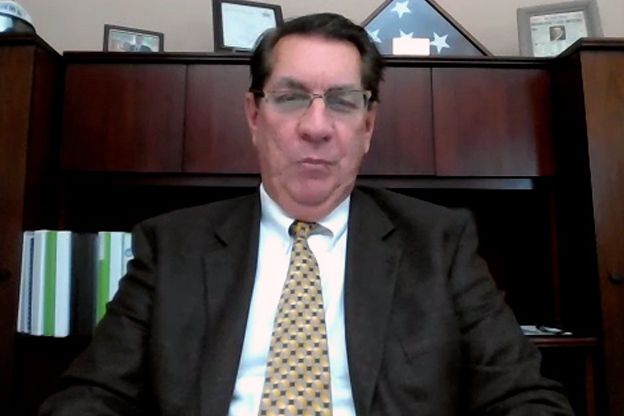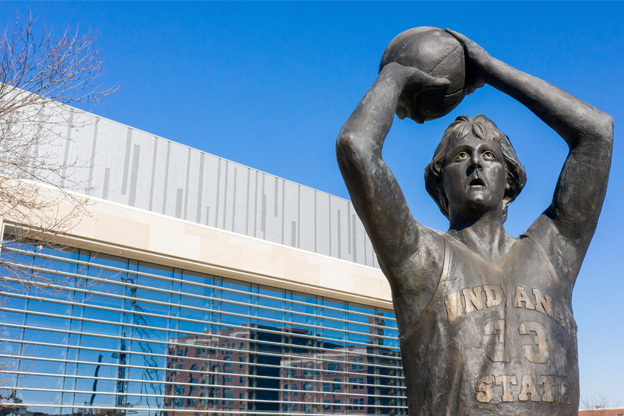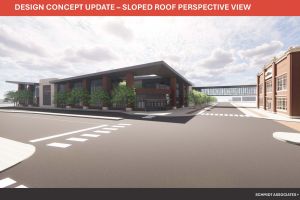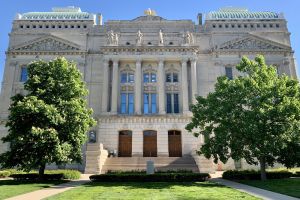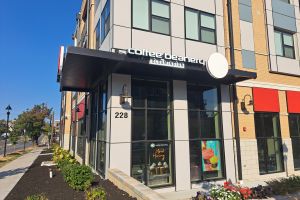Hello and welcome to ask the mayor on WFIU. I'm Joe Hren second week of the month. And as always, we find ourselves in Terre Haute with Mayor Duke Bennett. Hello, and welcome.
Unknown Speaker
Hello, Joe. It's good to be here today. You know, it just these months go so quickly. Like we just did this, but a lot of stuffs happened since last time and just appreciate the opportunity.
Unknown Speaker
And are the leafs starting to change? They're as they are over here starting to be beautiful out there, you're
Unknown Speaker
gonna see some brilliant colors. I mean, just starting to turn that I'm saying but I think it's going to be a pretty fall.
Unknown Speaker
Yeah, it's a wonderful time of the year. Speaking of that time of the year budget approved, I hear and big news, I'm sure you're really glad to have that off your back for now.
Unknown Speaker
Yeah, you know, the budget process is pretty intensive for you know, a city of our size, it's just, I mean, it's a multi month process. And to get to the end of that and get another unanimous vote, I think that's five years in a row of having a unanimous vote from the council. It's our eighth straight year of having a balanced budget went up about 8%. over last year, we'll give the 4% raises to our employees, and then our supply costs or diesel fuel, unleaded fuel. utility costs, those are kind of the big areas that went up in the budget, you know, no, looking at this year's actuals, we had some make some last minute changes on that. Just inflation, you know, kind of related things primarily. So I feel really good about the budget, I think we were very conservative on our revenue estimates. And, you know, and we were solid on our expenses, or what we need to spend and the council agreed with that and approved it very quickly. It was great that have very little discussion about that we have leading up to it, we have discussion, but everybody was good to go last week, and we got it approved. And now we take a sigh You know, a little bit of a breath, I guess, completing that one, but it's like, okay, now how do we finish strong for the rest of this year financially and making sure we're doing everything we need to do to collect all the revenue we can and make sure we're only spending the things we need to spend on so we have a great finish to this year.
Unknown Speaker
Well, and then you're still looking at how to spend the ARPA funds to write,
Unknown Speaker
yes, we did not put anything in the budget for our event, we're going to bring that as a separate appropriation to the council, we may have a small one this year, but then have a much bigger one next year, you know, all the funds have to be committed by the end of 2024. And spent by the end of 2026. So I don't feel a lot of pressure, even even though we've got some folks in our community that would like to, you know, participate in this and be able to be helped by these funds. We really want to make sure we do it right. And no one that we have money for matches for you know, we can use the ARPA funds some of that for matches for ready for, you know, road projects. So it's kind of putting that puzzle together. And so it's happening, it's just very deliberate pace.
Unknown Speaker
You know, something you said really struck me last month, you said Terre Haute had their biggest tax cap impact over $15 million that the city couldn't collect in an approved budget because of the tax caps. And it just really struck me how big a number that is. Because how big is the budget?
Unknown Speaker
Well, we get about $25 million a year in property tax revenue. So for all of our funds that get property taxes, if you had that extra 15 million, you know, you'd have $40 million you're collecting. And a lot of people still say all the tax caps. That's all news. You know, I happened years ago. Now that doesn't have any impact on today. But it absolutely does. assessed values have been going up a little bit finally, in Vigo County. But that doesn't mean you collect more tax money. It just means the calculation may show you owe more, but then the tax caps kick in. And so you get a credit, and you don't have to pay all of that. So when you kind of look at our general operating funds, overall, you know, you're talking about that 25 million being a pretty significant portion of that revenue. And yet you're leaving $15 million on the table. So I get it, nobody wants to pay more property taxes, you know, and that's why the tax caps came in. But people need to remember that even though assessed values go up. That doesn't mean we collect more. That's the bottom line.
Unknown Speaker
And just to compare that to the total city budget, how big is the city budget,
Unknown Speaker
the entire city budgets about 108 million 105 Nine I shouldn't say 100 5 million I was thinking that 8% increase Sorry 100 5 million, and so we get 25 million and right have an eight out of that. 100 Nate that's directly property taxes that go to serve people. There are some TIF revenues in there some TIF property tax dollars. But those can only be used for TIF projects. So when you look at the property tax component that comes in, that we deliver services with, it's 25 million to that 100 and 5 million.
Unknown Speaker
So we can see why every year when we talk about the Indiana General Assembly thinking about cutting taxes or cutting the business personal property tax that what you said could be another five or 6 million a year how that affects the city budget.
Unknown Speaker
Exactly. That would be devastating to us, you know, we've survived the property tax caps. And even though they're the biggest number and 22 that we've ever had since 2009, we've balanced the budget. But if we take another hit to business, personal property tax with no replacement revenue, I mean, you're talking about now having $20 million, or a little less a year to fund a budget like that, versus 25 million that would just be very devastating to all municipalities and counties, too. It would it would be a shockwave.
Unknown Speaker
You mentioned about preparing for the ready, Grant? I don't think it's been officially announced yet. But these are projects that have to be ready to go. So knowing that they're most likely will be another ready grant coming from this state. What projects are you looking at to be ready?
Unknown Speaker
So you know, this year's ready, Grant, ready one, if you will. We funded several projects locally, but not all of them. So we were hoping to get 50 million, we got 20 million for the region. So the team had to go back and figure out okay, who's getting what, so one, not everything got funded to the level we wanted to then other things didn't get funded at all. So I'm sure a lot of those projects will come back and another round of ready, hopefully, that the legislature will approve in this next session. And there probably be some new projects. So it'll be you know, there's no clear path to that. But all the projects, we proposed the first time we felt were important. And so I'm sure they'll come back. And then as I said, there'll be some new ones, but probably funded at not a huge, giant $1 amount level, they may have to do a planning process dollar amount, or they maybe they have to raise some additional funds, their match has to be bigger than what we thought because if we get 50 million, we're still spreading it across multiple counties. So I think we're in a great spot. We're doing exactly what the IEDC has asked us to do. But we'll have to open that process up again, if they approve another round of ready funds in the next legislative session.
Unknown Speaker
When that's something you touched upon to last month, the Workforce Development Plan. Can you tell us what that is and what you're aiming to do with that.
Unknown Speaker
So you know, I hear from mayors and others all across the state all the time about how we don't have enough people, there aren't enough people to take the jobs that we have open. Here in west central Indiana, really just about a four county area, four or five county, we've probably got 1500 jobs that are available a lot of in manufacturing, some healthcare and others that need to be filled. And yet, we're not getting that to happen. So our local people who would normally be in that pool are choosing not to take those jobs. So we've got to make the pool bigger, we need to bring people into our community. It goes back to quality life quality, place, access today care, housing availability, all those pieces are kind of part of that workforce development puzzle. There's the job training component and getting people prepared for these jobs. And so we're trying to look at it from a holistic perspective. I brought a group of people together a few weeks ago, our for college and university presidents, our workforce development team or economic development folks, our commissioners, county council, city council representation, and myself and said, Listen, we got to do something that we can't just keep doing the same things we've always been doing because the pool is not getting bigger. And so as part of our community plan, we want to improve the quality of life quality of place here by creating amenities and improvements of infrastructure. But this workforce development piece kind of stands on its own, and it's kind of all those things. And so we're gonna have a second meeting with all of our manufacturers here before long and find out what their needs are overall, find out where the priorities are, and we're going to figure out a way to help partner with them and fund these things to make it easier for them to recruit and retain employees. So I think it's going to be a long term efforts, not just a drop in the bucket, kind of a quick hit, but we're really starting something that we've never done before. going to have a total community collaboration effort going on to help our manufacturers help healthcare, help our education segments, they're all struggling with finding enough employees to fill the jobs that they need. And so we're going to help them get qualified for that. We're going to help bring new people to the table and figure out what we can do to sustain that over the long term.
Unknown Speaker
And something I'm sure goes along with that we talked about with Mayor Lindop. In Columbus last week, I will be talking with everyone about this as housing. I know Indiana had a task force forum, Statehouse reporter reported on and talked about, you know, some cities have high rents, people are forced out of where they live. There's not enough housing. Some cities have high housing requirements that price people out, what's the situation like they're in Terre Haute, I assume this is something you're dealing with, too.
Unknown Speaker
Yes. And so that'll be part of this workforce development plan, as I mentioned, because in order to bring new people to community, obviously, you have to have quality housing for them. So if you if you don't have that all the other stuff you do may not even have a bearing. So we know that's important. thrive in west central are one of our local economic development arms is working and finalizing. I mean, we should have take delivery of this document in the next couple of weeks. But a housing study for this region, the state is doing their housing allowances and, and looking at in this next I'm told in this next reading grant, there's going to be a carve out of money just for housing, we're looking at arco funds to do housing, we're looking at new casino revenues are going to be coming into our community to help with housing. So that may be in the form of builder incentive programs, it may be in the form of constructing things and selling them, you know, to facilitate more market activity. It might be all of the above, I mean, we need more high quality apartment buildings, there are some people that just they want to own they want to ramp rents are going up here, we have an old housing stock here. So we tear houses down, we get a few new ones built, but we're gonna have to ramp that up. So it's another one of those kind of across the board approaches that some things may work better in one community than they do in another. But we know we need a little bit of everything here, we need to hit all of the housing availability needs to grow in all those areas, we need to have more options on the table. So more roll that plan out over the coming months, we're just waiting on this study to come back first to confirm what we kind of already know. But to give us the baseline to move forward with our incentives to be able to help build this out.
Unknown Speaker
This kind of takes us to the 12 points area to some people may not be familiar with that who don't live in Terre Haute, can you give us a brief background on that, and especially now because City Council looking to change the area's zoning to try to attract more businesses.
Unknown Speaker
So there's been a lot of activity in the 12 points area, it's a an area on the North Central side of the city that used to be a bustling retail area, you know, back in the day, as people like to say it's seen a resurgence of small business come in there. It's had a sad a lot of you know, hits over the years. But it's seen a lot of energy, the passion from a group that is up there, the 12 points revitalization committee, we've the city is partnered with them and I hired a local firm to develop a strategic plan that will become public here in the next week or so that we're excited about to kind of take us what the next five years might look like. And one of the pieces of that one of the conversations we've had is should the zoning in that area up there mirror what we have in downtown, there's some certain restrictions and some certain things you need to do. But at the end of the day, it provides some guardrails, I guess is the best way to put it, you know, building up to the sidewalk as an example or meeting a variance to not do that. Putting some things in place that will make it a more it develops out the way we want our downtown to develop. So we have another note, if you will, that will have the same guidelines in place and same rules from a zoning perspective. So the residents, the owners, business owners up there seem to be excited about that. We're good with it from the city's perspective. And hopefully this will be another tool to encourage development but be responsible development in that area. And I think bigger and brighter things are even coming up there. I mean, a lot has happened. But now we're looking for bigger things.
Unknown Speaker
Yeah, it'd be interesting to see I kind of one more thing I know we got to get going the city had the moonlight on the Wabash event, held by river scape as the city is embracing the Wabash River as an economic as an economic activity amenity. I did see the art fountain of course. was when I was there last time in the sculpture in front of City Hall. So what's new in that endeavor?
Unknown Speaker
So the biggest thing that I can report on is as a local community, we are working together to hire a consultant to develop our next 10 year plan for the Wabash River. Our other plan was completed in 2008. So it was time for us to do that. And what's exciting is to see all the partners coming together. I mean, they see that we've made progress. Some would like faster progress, I get that. But we need to kind of reestablish the beachhead, if you will, that. Here's what here's what we've accomplished. Here's what our targets are kind of that low hanging fruit, mid range things and more of the longer term things. We're working with the Army Corps of Engineers, we've hired a consultant to develop the Fairbanks Park master plan that will fold right into the riverfront plan. There's a lot of things going on with the riverfront, it just if you if you go look at it, you would say I'm not seeing anything. But behind the scenes, there's a tremendous amount of activity. And I would expect over the next 10 years, we'll see two to three times as much development and growth that we've seen over the past 10 years, it's we've really ramped this up to take it to another level. So I'm excited about that the river is an important part of our community. And people are beginning to embrace that. And you're going to see much more investment, both public and private investment.
Unknown Speaker
Really quick, have you heard anything about the Larry Bird Museum in the convention center?
Unknown Speaker
We continue to work with Larry birds agent to get the materials all identified and what's going to be in it. The build out is underway. We hope to open it next year. But I don't have I don't want to pin ourselves down. Because it seems like we run into a little obstacle every time we do that. But the goal would be to get it open next year at some point. That was all I had. Did you have anything that you'd like to add any announcements or special news? I don't think so, you know, as we always talk, we're kind of wrapping up the construction or moving into the fall the students are back as US homecomings coming up. That's always kind of a big deal in our community. You know, there's just a lot of excitement, a lot of festivals going on a lot of events outdoors, and I love this time of the year. It's my favorite time of the year. And I just hope we have a nice long extended fall and winter does it come in the new year comes and it all starts all over again. So it's an exciting time in Terre Haute right now. All right,
Unknown Speaker
well, thank you so much. And we'll see you next time. Appreciate your time.
Unknown Speaker
Okay, thank you, Joe. All right. Bye bye.







